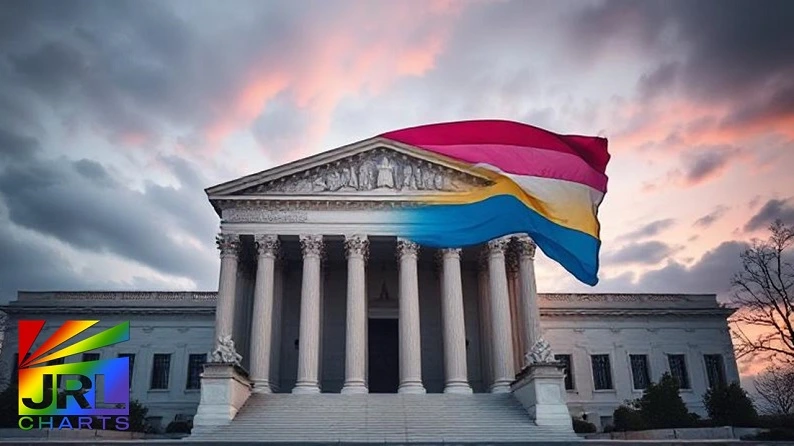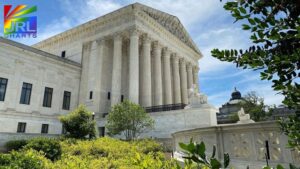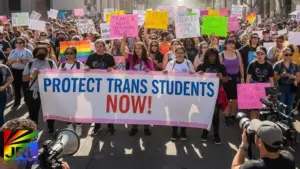By: Paul Goldberg, Senior Editor | JRL CHARTS – LGBT Politics USA
WASHINGTON, D.C. — (July 3, 2025) — The U.S. Supreme Court has agreed to take up a pair of pivotal cases that could determine whether states can legally bar transgender girls from participating in girls’ sports — a decision that could shape the rights of transgender youth across the nation for years to come. What will the court decide?
Related Links on JRL CHARTS:
-
Buttigieg Surges to Top in 2028 Democratic Presidential Primary Poll
-
SCOTUS Greenlights Ban on Trans Youth Healthcare in Shocking 6-3 Ruling
- Get the Latest in LGBT Politics USA — Only on JRL CHARTS
The cases, which originate from Idaho and West Virginia, challenge laws that restrict student-athletes based on sex assigned at birth. In both instances, lower courts ruled that the laws violated federal protections — Idaho’s law under the Equal Protection Clause of the Constitution, and West Virginia’s under Title IX, the federal statute banning sex discrimination in schools receiving federal funding.[¹]
Arguments are expected this fall, with a ruling likely to be issued by June 2026.
A Supreme Court Pattern Emerges on Trans Rights
This marks the Court’s third major case involving transgender rights in five years. In June 2025, the conservative majority upheld a Tennessee law banning gender-affirming care for minors, sparking national backlash from LGBTQ+ advocacy groups.
Notably, the Court’s 2020 ruling in Bostock v. Clayton County took a different turn, affirming that federal employment law protects transgender individuals — an unexpected 6–3 decision now seen as an outlier amid a growing string of conservative judgments on LGBTQ+ issues.[²]
Trump’s Role in the Shifting Legal Landscape
The Trump administration continues to reshape transgender policy nationwide. In February 2025, President Donald Trump signed an executive order instructing the Department of Education to withhold federal funding from institutions that allow trans women to compete on women’s teams.
This week, the University of Pennsylvania became the first major institution to formally comply, adopting so-called “biology-based definitions” of sex as a condition of retaining federal support.
Earlier this year, the Supreme Court granted an emergency request from the Trump administration to enforce its ban on transgender military service, greenlighting discharges and barring future enlistment. Justices Sonia Sotomayor, Elena Kagan, and Ketanji Brown Jackson dissented.
The Plaintiffs: Students at the Center of the Fight
The West Virginia case centers around Becky Pepper-Jackson, a transgender student who challenged the state’s Save Women’s Sports Act when she was in middle school. She has since played multiple sports consistent with her gender identity — but her ability to continue may now hinge on the outcome of this case.
West Virginia Attorney General JB McCuskey praised the Supreme Court’s decision to hear the appeal. “The people of West Virginia know it’s unfair to let male athletes compete against women,” he said. “That’s why we passed this commonsense law preserving women’s sports for women.”
In Idaho, the lawsuit targets the first anti-trans sports law in the country, passed in 2020. The measure mandates that athletes must compete based on sex assigned at birth — and permits invasive physical testing to verify eligibility when challenged.
One of the lead plaintiffs is Lindsay Hecox, a transgender runner who hoped to compete at Boise State University. Another is a 17-year-old cisgender girl who objected to being subjected to sex-verification procedures simply for participating in school sports.
National Implications for Youth Athletics
Twenty-seven states now have laws that restrict transgender athletes in K-12 or collegiate sports. The NCAA, under pressure from the federal government, moved in February 2025 to tighten eligibility criteria for trans women athletes — another sign of cascading policy shifts.[³]
“This fight is about dignity, fairness, and safety,” said ACLU attorney Joshua Block, who represents plaintiffs in both cases. “Categorically excluding kids from school sports just because they are transgender will only make our schools less safe and more hurtful places for all youth.”
What Comes Next
The Court’s decisions in these cases will not only determine the fate of two state laws — they will likely set the national standard for transgender participation in school sports.
If upheld, such laws could cement legal justifications for biological-essentialist policies in education and athletics. If struck down, they may bolster federal protections for transgender students under Title IX and the Constitution.
Either way, the rulings could become the most consequential decisions for transgender civil rights since the 2020 Bostock case.
FOOTNOTES
[¹] Title IX, enacted in 1972, bars discrimination “on the basis of sex” in education — its interpretation has evolved through case law to include gender identity in some courts.
[²] Bostock v. Clayton County, 590 U.S. ___ (2020), extended Title VII protections to LGBTQ+ employees.
[³] NCAA policy changes followed an executive directive from the Trump administration, though the association maintains that decisions are “based on fairness in competition.”
Stay with JRL CHARTS LGBT Politics USA for real-time coverage on how this ruling could reshape civil rights for transgender youth.
- Eldorado Introduces Dynamo Wellness Arousal Cream by ScreamingO to Retailers - February 20, 2026
- American Idol Alum Caleb Flynn Charged With Wife’s Murder in Ohio Case - February 20, 2026
- Cory Stewart Drops “What Dies Inside (While We’re Alive)” Official Music Video - February 20, 2026
// Affiliate Disclosure: JRL CHARTS is a digital news and media platform. We do not host, stream, or sell adult content. Some outbound links may contain affiliate tracking to licensed studio-owned platforms (e.g., LatinBoyz, AEBN, BiLatin Men). These links lead to legal, age-gated distributors and are provided strictly for editorial and informational purposes only.







